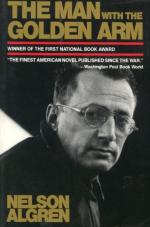|
This section contains 196 words (approx. 1 page at 300 words per page) |

|
Algren falls without a doubt into the camp of traditional literary realism, along with Theodore Dreiser and Stephen Crane, but his most complete identification is with Walt Whitman, whose democratic vision included "conquered and slain" persons as well as victors, and with Carl Sandburg, the poet of Chicago. Because of his comic style, his ironic humor, and his technique of dialogue and depiction of low-life characters, he has roots also in Mark Twain and in the Midwestern tale of riverboat brawlers, eye-gouging wrestlers, con men, and gamblers.
Looking at the continental roots of his realism and his urban settings, one finds elements of Villon, Zola, and Baudelaire. In his philosophy Algren recalls Jean-Paul Sartre's No Exit (1944), most notably in the portrayal of human relationships in which men both devour and seek to be devoured, where they seek to be united with others and yet seek independence...
|
This section contains 196 words (approx. 1 page at 300 words per page) |

|




